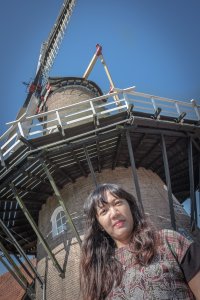Donatella Gasparro from Italy: ‘Learning a new language opens doors in your head.’
text Yvonne de Hilster photos Guy Ackermans
‘Fine, see you Friday’, emails Italian student Donatella Gasparro to confirm our interview appointment. In Dutch. She is studying Organic Agriculture and she started a Dutch course at Wageningen in’to Languages in January. ‘During the first week of my AID, I heard nothing but “gggg” all around me. Now I can hear some structure in the sentences. But the g is still my favourite Dutch sound, and “grappig” is a funny word for funny,’ she tells me during the interview.
The course Gasparro is taking is Social Dutch, a beginner’s course offered by Wageningen in’to Languages. There are three levels (see inset). The teacher speaks Dutch only throughout the class. ‘That is quite difficult for them,’ says Sanne Hogenhuis, a teacher of Dutch as a second language. ‘But we put the students to work themselves as much as possible, getting them to talk a lot and practise their pronunciation. We talk about Dutch culture too, like the fact that you are served cake at a birthday party and are not expected to bring it yourself.’
It is easier to make contact with people, if you try to understand their culture
Gasparro started the Social Dutch course for several reasons. ‘I like learning new languages, because you also learn to think in new ways; it opens doors in your head. And language is culture too, and I’ll be staying here at least two years, so it would be silly not to learn any Dutch.’ She is already using her Dutch as a student assistant at Farming Systems Ecology. One of the things she helps out with is field trips in the Netherlands. ‘Not everyone you visit finds it easy to speak English.’

Raissa Rustandi from Indonesia: ‘Old people would rather speak Dutch with you.’
Do you need stamps?
Raissa Rustandi from Indonesia, an MSc student of Food Technology, started the Social Dutch course because she thinks it will improve her career prospects. ‘At the Career Day, I heard one company say that they expect international employees to be able to conduct an everyday conversation in Dutch. And it can be an advantage for a job with a Dutch company in Indonesia. I also think foreigners coming here should adapt to the Netherlands. Luckily, everyone in Wageningen is very open-minded, but old people would rather speak Dutch with you.’
The emphasis in Social Dutch is on understanding numbers, phrases such as ‘how are you’, ‘thank you’ and ‘do you need stamps’, and pronunciation, says Rustandi. ‘I think it’s a good thing the teacher speaks Dutch in class. It trains your ears. Understanding and speaking are hard, but reading is quite easy.’ It helps a bit that she had a couple of years of German at school in Indonesia, and did an internship in Germany during her Bachelor’s degree.

Mathilde Coutant from France: ‘A lot of Dutch words, like ‘wortel’ don’t ring any bells for me’
At the market
Mathilde Coutant, a French Master’s student of Animal Sciences, is on Social Dutch III. Her biggest difficulty is with Dutch sentence structure and word order, as well as with remembering words that don’t ring any bells for her. ‘There are lots of words that I can’t relate to English, French or Latin, such as huur, wortel and tuin.’
Coutant never imagined she would learn Dutch. ‘When I came to university here, I knew you could do everything in English and I thought I would go straight home after graduating. I was more interested in improving my English. I started Social Dutch last year to surprise my boyfriend – who is Dutch. But after the first course I went on because I noticed that my other Dutch friends appreciate it when I try to speak Dutch. I find it makes it easier to make contact with people, because you show you are trying to understand their culture. I have noticed that if I speak a few words of Dutch in shops or at the market, people react more cheerfully. Speaking Dutch has its advantages in group work too, if you can follow the conversations between Dutch students, and pick up the subtle details.’
Free courses
Like Gasparro and Rustandi, Coutant is happy with the course and its low-threshold, practical approach. And with the price too (see inset). But the Student Council thinks there should be more free Dutch courses for international students. ‘It is good for their integration and inclusion if there is less of a language barrier,’ says initiator Amit Choudhary of the Sustainability & Internationalization party. ‘Several other universities already offer free Dutch lessons. It makes students feel welcome.’
One third of the annual WUR budget for affordable language courses for students (170,000 euros) goes towards Social Dutch, says Liesbeth van der Linden of Corporate Education & Student Affairs. The rest goes towards courses in English, Academic Writing, French and Spanish. ‘With the growing numbers of students, there could be reasons to allocate more budget to this; we still need to look into that. The priority lies on English language skills because they are important for students’ studies.’
Social Dutch Course
International students who want to learn Dutch can take the courses Social Dutch I, II and II at Wageningen in’to Languages. Two groups at every level, each with a maximum of 18 students, start in September, January/ February and April/ May. The groups are always full.
All the courses consist of 15 classes, twice a week, with a final test. The classes are held on campus, late afternoon or early evening. Thanks to a subsidy from the university, students pay only 90 euros rather than the full 400 euro fee. For international staff and PhD candidates there is the Basic Dutch course (12 classes).
